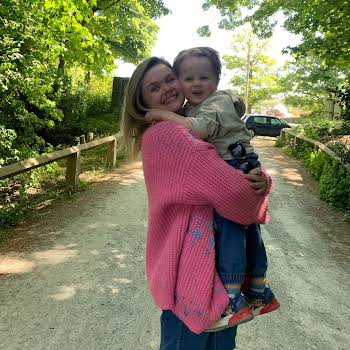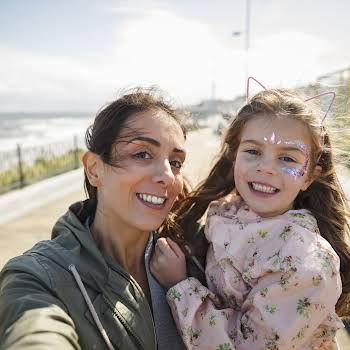
By Amanda Cassidy
27th Aug 2018
27th Aug 2018
Ireland has one of the highest incidences of sarcoidosis in the world. In fact, more Irish people suffer from this condition than cystic fibrosis. Sarcoidosis is an inflammatory disease where the immune system goes into overdrive, causing cells to group together into clumps called granulomas. Amanda Cassidy speaks to a working mum of two children about her more rare diagnosis of neuro sarcoidosis, the daily challenges she has to overcome, and how it has revealed a new inner strength.
“You don’t look sick.” This is probably the most annoying statement I’ve heard during my experience of living with a chronic condition and invisible illness. To be fair I don’t necessarily look sick, but I don’t look like me either. For eight years I have been living with neuro sarcoidosis, but to the world, I don’t look sick, no visible signs that something is wrong. My life looks pretty good to those looking in: I have an amazing husband, I have two wonderful children and work full time. I have a successful career, holding a Global role with a multinational financial services company. But I also carry a secret and it makes me different. People don’t see how my condition impacts me every day, the planning and organising I have to apply to everyday life to make sure I get through it. They can’t understand what they can’t see.
An invisible illness
This condition has changed not only my life but that of my loved ones. How I approach both my home and work life has had to evolve so that I can have the best experience for me and my family. I am lucky in many ways, I have an amazing support structure in my husband, parents, siblings and even my children who help me every day.
However, I have missed opportunities and I have lost friends, grown distant from others, having an invisible illness looks like someone having lots of excuses to cancel. Believe me, I wish I could go to every social event, but I have to plan ahead and take each day as it comes.
Recently I attended a friend’s birthday party in their house, it was low key, a few drinks to celebrate his day. I lasted 4 hours which was great, but what people didn’t see was that I had to nap for 3 hours the day of the party and stay in bed most of the next to recover so that I could go to work again on Monday.

My diagnosis
It started with recurring headaches, as a mum returning to work, I had largely dismissed these as just one of those things all working mums deal with when going back to work. Then came word jumble, again I put this down to baby brain, nothing to be worried about and just kept on as normal, taking painkillers to get me through the day. After three months, I started having a number of random symptoms which I couldn’t explain away and attribute to “just being a new mum”. It was an eye infection that finally took me to the doctor and my first of many visits to hospital. I had severe eye pain, sensitivity to light, redness and constantly had “floaters” impacting my vision. I was diagnosed with bilateral uveitis and while a clinical diagnosis would not arrive until a year later, this was the beginning of my journey of living with an autoimmune condition. The immediate treatment involved corticosteroid eye drops and steroidal anti-inflammatory medication. After a few weeks it all seemed ok and so I went back to my normal routine. Then came facial palsy. While sitting in a management meeting with my colleagues, I started noticing people staring that bit too long, or giving me funny looks. Then they began asking me in a whispered voices “are you ok? It turned out that my face had “fallen”. While the hospital could confirm it wasn’t a stroke, they didn’t know what was causing the palsy. I was sent home with a prescription for more steroids, antiviral and antibiotics.
“I cried daily”
This is where luck and fate jump in, I texted my friend who is an ENT specialist to tell her what had happened, and she insisted I present to A&E the following day and she would go through several tests. I failed them all! I still had the palsy, the bilateral uveitis was back, and now I was failing hearing tests. Blood work, MRIs and CT scans were all ordered as she made a note on my file… “Query SARCOIDOSIS?” Little did I know that it would take an additional 8 months of a working clinical diagnosis, a long stay in hospital and multiple investigations before I would have a formal diagnosis of Neuro Sarcoidosis. I left the hospital that day with a prescription for more steroids, appointment cards for my scans and an appointment to return for my blood work. In the coming weeks, while frustrated and anxious about the impending diagnosis, I felt reasonably ok for the most part and so I decided to go as planned on our family holiday to Spain. It was a disaster.
I was so tired that I cried daily. My poor son on his first sun holiday had a mum who couldn’t bear to be in the sun, my light sensitivity was back, the headaches were awful and now I had phantom smells that no one else could smell.
Worst of all was the exhaustion, I actually face planted my dinner one evening as I just couldn’t bear to be upright, my poor husband had to carry me home while my in-laws looked after our son. I went back to work not thinking about what was going on, I was in my own little daze and oblivious to how I looked. But when my friend saw me she begged me to go straight to the doctor and I realised something was very wrong. I looked in the mirror and I was shocked at my reflection, my skin was grey with dark circles under my eyes which were extremely bloodshot – I looked like a zombie. My GP sent me to A&E because of my recent history and I was admitted straight away. Test after test was scheduled – the facial palsy was back, as was the uveitis, headaches and now I had vasculitis and aseptic meningitis. MRIs revealed I had scarring (granulomas) on my central nervous system and a calcified lump behind my right eye. Lumbar punctures confirmed I had elevated protein levels. My liver function tests were causing concern as were the results from a number of ultrasounds. I was in hospital for just over 3 weeks, but they could not conclusively diagnosis me with a condition other than “auto-immune”.
It would take a misdiagnosis of MS, the possibility of a brain tumour and a biopsy of my liver and lungs before I was officially diagnosed with Neuro Sarcoidosis. It was 14 months after my first symptoms, a time frame which I’ve since learned is very quick.

Not part of the plan
When my new consultant finally confirmed they knew what was wrong and more importantly what we could do, we saw it as good news. Once that initial reaction passed, reality kicked in. We had only been married 3 years, my son was 18 months old, and this was not part of the plan. I had ruined everything – funny how the mind works, it certainly wasn’t my idea to get sick. I had always been full of energy and bubbly, loved socialising and being out with family and friends. But over the course of a year, I had turned into someone with no energy or desire to do anything, not what my husband had married and very confusing for my son.
Weekends had become sleepathons, sleeping all day and night and constantly fighting the feeling of pure exhaustion. This was tiredness on a new level, I had zero energy, and it pained me to move or talk. This phase lasted about 8 months, and I began to feel a bit more normal. Sleep and rest were and are still a big part of my life but finally, I could manage to get through the day without needing to be asleep by 7 pm. After dealing with the news, and talking with my husband and family, I felt in a good place until I thought of work and I was worried on how this would be received by those outside of my inner circle. What will people think?. What will my colleagues and managers think and how will this impact my career. Before my admission to hospital, I had hidden it all so well, playing it off as a bad viral infection, I certainly didn’t mention chronic autoimmune condition. I was afraid, afraid of the stigma and what might happen to my career plans.
Juggling work and chronic illness
Obviously, my colleagues knew I was unwell and I needed to take an additional 6 weeks off to focus on recovering. I was fortunate to have a very supportive and understanding manager whose main concern was for me to get better. I was able to work from home one day and I took one day for medical leave to sleep – I would sleep for 20 hours during the first few months on my Wednesdays to re-energise. My condition and medication zapped my energy further; I needed to sleep at every opportunity. Slowly I began to come out of the slumber state, thanks to steroids, but with this change, came another challenge, weight gain.
While I don’t look sick, I don’t look like me either. Not to be vain, but it’s tough to look in the mirror and not recognise the face and body in the reflection. If I am honest, this has been one of the hardest aspects to deal with, I just don’t feel or look like me, even 8 years on.

This will not define me
Turns out I am quite resilient, or stubborn some might say and I decided that this illness was not going to define me. I am a firm believer in positive mental attitude and its ability to help you get through what life may throw. After trying multiple treatments, steroids are my necessary evil. They have helped manage my condition so that I can have a somewhat normal life.
I strive for normality for my family. My husband and I have been lucky enough to have another child, a daughter born in 2013 who we are very thankful for and realise that this was a risk but I was adamant I wanted to grow our family. After 11 years with my company, I decided to take a new role with a new company in 2017, a crazy decision in many ways. I was taking away my comfort blanket. The decision was simple in one way; I wouldn’t pass up this opportunity if I didn’t have an autoimmune condition, and so I certainly wasn’t going to let it affect my career choices now. Only a few people know of my condition in my new company and I’ll most likely keep it that way for now. It’s a matter of trust. Selfishly, I need some people to know as I have good days but obviously bad days too.
I wear a mask to work every day. Smiling on the outside, confident in my abilities to perform well but underneath it all, I am usually fighting to maintain a sense of normality.
From a work perspective, I always give 100% but sometimes I need time out. I have become a master planner and an efficient user of time. I have found strength and resourcefulness I didn’t know was there! I calculate value and cost-benefit for everything I do, for my time, energy and my deliverables. To date it has worked 90% of the time, again I’m lucky I can manage my career with the flexibility and support of working with another global company who really focuses on their people.
‘I don’t know what the future will bring’
This condition has changed me both physically and mentally. It factors in every moment of every day. I am engaged in a cycle of continuously rationing energy, avoiding stress (easy right!), planning every task/outing and juggling it all while still being a good mum and working full time. It’s tough, my confidence is not the same, how I interact with people has changed, I am uncomfortable in my own skin, especially when meeting new people! I plan everything. I have to avoid the sun and I overheat very quickly. I have physical and visible reactions to the slightest temperature increase that are embarrassing, swelling, turning purple and sweating is not a good look, especially sitting at your desk or in a meeting. Weekends are full on when I have the energy, I organise events constantly, making memories, photographing as much as possible – lots of selfies of me and the kids.
I don’t know what the future will bring but I know my kids will have had the best life I was able to give. I’ve learned that I have to be selfish at times and make sure I do what is right for me.
I have developed a number of coping mechanisms to deal with the stresses of everyday life. I love brain training and make sure I complete a number of tasks daily. I switch off for at least 30 mins every day, reading or watching television to unwind. And hugs, lots of hugs from my two wonderful kids.
You are stronger than you think
The support network of my husband, family and close friends has made this journey so much easier for me. I am lucky and they help me navigate this journey every day in little ways, I am eternally grateful for their support and understanding. The most important thing I can say to others living with a chronic illness would be, you are stronger than you think. Talk to your family and friends and more importantly let them help you. We all need support and help in this life, some just a little more.





















